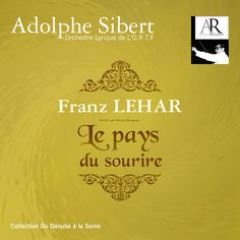Franz Lehar - Le Pays du Sourire (Das Land des Lächelns) (The Land of Smiles) [1971/2000]
Franz Lehar - Le Pays du Sourire (Das Land des Lächelns) (The Land of Smiles) [1971/2000]

1 Acte I : Ouverture 00:08:20 2 Acte I : Introduction et Entrée 00:03:58 3 Acte I : Duo - On reste bons amis 00:02:20 4 Acte I : Air -Toujours sourire 00:05:15 5 Acte I : Duo - Prendre le thé à deux 00:04:15 6 Acte I : Lied- Dans l'ombre blanche des pommiers en fleurs 00:04:08 7 Acte I : Finale 00:07:37 8 Acte II : Cérémonie de la jaquette jaune 00:06:56 9 Acte II : Duo -Qui dans nos coeurs a fait fleurir l'amour 00:04:58 10 Acte II : Chanson dansée -Au salon d'une pagode 00:03:19 11 Acte II : Duo -Mon amour et ton amour 00:02:54 12 Acte II : Je t'ai donné mon coeur 00:03:47 13 Acte II : Air - Je veux revoir mon beau pays 00:01:35 14 Acte II : Duo - Je suis ton maître 00:04:20 15 Acte II : Finale Acte 2 00:04:39 16 Acte III : Finale 00:06:54 Lisa - Christiane Stutzmann, soprano Mi - Monique Stiot, soprano Sou-Chong - Alain Vanzo, tenor Gustave - Jean Christophe Benoît, tenor Tchang - Bernard Demigny Orchestre Lyrique de l'O.R.T.F. Adolphe Sibert - conductor
With the exception of Die lustige Witwe which together with Die Fledermaus has claims to be the best operetta ever, Das Land des Lächelns is the most popular of all the Lehár stage works.
Ironically much of the music for Das Land des Lächelns was written several years earlier, in 1923, for Die gelbe Jacke (The Yellow Jacket), which was a flop. However in 1929 Lehár reworked it to a new libretto and with Richard Tauber in the central role of Prince Sou-Chong it became a resounding success. More serious, even tragic, than Die Witwe, it is filled with memorable songs and a scoring that is far more advanced than in most other operettas. Partly set in China it can be tempting to compare it to Puccini’s Turandot, written at about the same time. Although the differences are obvious, with Puccini’s harmonic language considerably bolder, that doesn’t necessarily mean that Lehár emerges second best. The orchestral and choral introduction to the second act can confidently stand comparison with Puccini. ---Göran Forsling, musicweb-international.com
Lehár is remembered for his sterling score: The Merry Widow. Although always regarded as a light-weight composer, he introduced a new wave of operetta and may be regarded as one of the fathers of the ‘Musicals’.
Putting the Merry Widow aside, Lehár came to fame with The Count of Luxembourg in 1909 and when a series of romantic operettas followed. In 1923 The Yellow Jacket (Die gelbe Jacke) was given a Chinese setting and it told a story of an oriental prince and a Viennese woman. Despite its spectacular staging the production was only moderately successful with around 100 performances. However, Lehár relaunched this work as The Land of Smiles (Das Land des Lachelns/Le Pays du Sourire) in a much revised form six years later. The work then gained immortality. Traubner who has researched the operetta tells us that the secret of its successful relaunch was principally due to three items– firstly a much improved libretto, secondly a magnificent song for Sou-Chong, ‘Yours is my Heart alone’ and thirdly by giving the principal tenor part to a known star, Richard Tauber. In fact Tauber, the world-famous Austrian tenor of the '20s, brought fame to four of Lehar’s scores during this period (1925-9).
Le Pays du Sourire (The Land of Smiles) is a straightforward tale of a prince, Sou Chong of China (Michel Dens), who woos and quickly weds Lisa, a lady of Vienna (Bernadette Antoine). He then takes her home to China at the end of the first Act. [In moving the action from West to East between Acts we are thus provided with the vehicle for a grand transformation of setting.] In Act 2 a twist to the previously happy climate of Act 1 reveals that Lisa has found she has difficulty in adapting to the ways of the East. Lisa sings her poignant song, ‘How I long to see my homeland again’(CD2 tk.12), a number skilfully composed to emotionally stir the audience. A final shock comes when the Prince declares that he intends to take more wives, and Chinese ones at that. A further twist lies in the fact that one of the Chinese princesses, Mi (Sylvia Paule) longs for some of the freedom that only the West can offer. She is provided with some lovely musical moments by Lehár in a both a solo and duet. ---Raymond Walker, musicweb-international.com
download (mp3 @320 kbs):
Last Updated (Tuesday, 29 May 2018 14:21)








